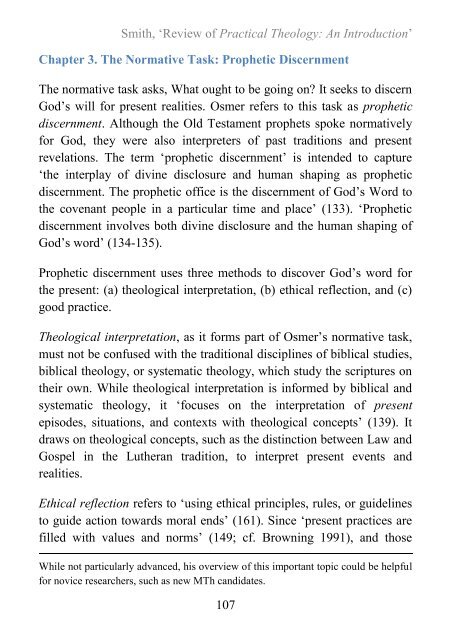Conspectus, vol. 10.pdf - South African Theological Seminary
Conspectus, vol. 10.pdf - South African Theological Seminary
Conspectus, vol. 10.pdf - South African Theological Seminary
You also want an ePaper? Increase the reach of your titles
YUMPU automatically turns print PDFs into web optimized ePapers that Google loves.
Smith, ‘Review of Practical Theology: An Introduction’<br />
Chapter 3. The Normative Task: Prophetic Discernment<br />
The normative task asks, What ought to be going on It seeks to discern<br />
God’s will for present realities. Osmer refers to this task as prophetic<br />
discernment. Although the Old Testament prophets spoke normatively<br />
for God, they were also interpreters of past traditions and present<br />
revelations. The term ‘prophetic discernment’ is intended to capture<br />
‘the interplay of divine disclosure and human shaping as prophetic<br />
discernment. The prophetic office is the discernment of God’s Word to<br />
the covenant people in a particular time and place’ (133). ‘Prophetic<br />
discernment in<strong>vol</strong>ves both divine disclosure and the human shaping of<br />
God’s word’ (134-135).<br />
Prophetic discernment uses three methods to discover God’s word for<br />
the present: (a) theological interpretation, (b) ethical reflection, and (c)<br />
good practice.<br />
<strong>Theological</strong> interpretation, as it forms part of Osmer’s normative task,<br />
must not be confused with the traditional disciplines of biblical studies,<br />
biblical theology, or systematic theology, which study the scriptures on<br />
their own. While theological interpretation is informed by biblical and<br />
systematic theology, it ‘focuses on the interpretation of present<br />
episodes, situations, and contexts with theological concepts’ (139). It<br />
draws on theological concepts, such as the distinction between Law and<br />
Gospel in the Lutheran tradition, to interpret present events and<br />
realities.<br />
Ethical reflection refers to ‘using ethical principles, rules, or guidelines<br />
to guide action towards moral ends’ (161). Since ‘present practices are<br />
filled with values and norms’ (149; cf. Browning 1991), and those<br />
While not particularly advanced, his overview of this important topic could be helpful<br />
for novice researchers, such as new MTh candidates.<br />
107

















